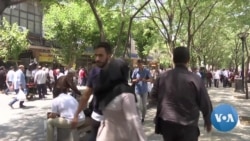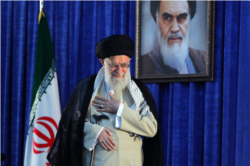Iranian officials on Tuesday dismissed new U.S. sanctions as putting an end to any diplomatic path for resolving tensions between the two countries, and further described U.S. overtures for dialogue as disingenuous.
U.S. President Donald Trump issued the economic sanctions Monday against Iranian Supreme Leader Ayatollah Ali Khamenei and eight senior commanders in the Iranian military and the Islamic Revolutionary Guards Corps. He called on the Iranian government to "change its destructive behavior, respect the rights of its people, and return in good faith to the negotiating table."
U.S. National Security Adviser John Bolton said Tuesday during a visit to Jerusalem that Trump "has held the door open to real negotiations," and that Iran has responded with what he called "deafening silence."
WATCH: US 'hard-hitting' sanctions on Iran
But coupled with the U.S. threat to also add sanctions targeting Iranian Foreign Minister Mohammad Javad Zarif, the country's President Hassan Rouhani called the Trump administration's moves "outrageous and idiotic."
"You sanction the foreign minister simultaneously with a request for talks?" he said during a televised address.
Hours earlier, Iranian Foreign Ministry spokesman Abbas Mousavi wrote on Twitter that Trump's approach is "destroying the established international mechanisms for maintaining world peace and security."
"Imposing fruitless sanctions on Iran's leadership and the chief of Iranian diplomacy mean the permanent closure of the road of diplomacy with the frustrated U.S. administration," Mousavi said.
Trump wants Iran to engage in new talks over its nuclear program after he withdrew the United States from the 2015 international pact restraining Iran's nuclear activity in exchange for relief from sanctions that badly hurt the country's economy. He further imposed fresh sanctions, including those seeking to choke off Iran's key oil exports.
Iran has repeatedly denied it was working to develop nuclear weapons, and the U.N. nuclear watchdog charged with monitoring the 2015 agreement has certified Iran was in compliance with the terms of the deal.
As the Trump administration has increased its pressure on Iran in recent months, and as Iran has complained that the other signatories to the nuclear deal have not done enough to help it maneuver around the U.S. sanctions, Iranian officials have pledged to stop abiding by some certain restrictions it had agreed to such as the amount of highly enriched uranium it can have.
Trump called his order a "strong and proportionate" American response to Tehran's shoot-down last week of an unmanned U.S. drone, which Washington says occurred in international airspace near the Strait of Hormuz and Iran claims occurred over its airspace.
The U.S. leader said he imposed the sanctions because of a series of "belligerent acts" carried out by Iran, which U.S. officials say include Iran's targeting of Norwegian and Japanese ships traversing the Strait of Hormuz with mine explosions days before the attack on the drone.
"We'd love to be able to negotiate a deal," Trump said.
But he declared, "Never can Iran have a nuclear weapon," adding, "They sponsor terrorism like no one's seen before."
He said, "I look forward to the day when sanctions can be lifted and Iran can be a peace-loving nation. The people of Iran are great people."
U.S. Treasury Secretary Steven Mnuchin said earlier sanctions imposed when Trump pulled out of the international agreement have been "highly effective in locking up the Iranian economy."
He said some of the sanctions Trump imposed Monday had been "in the works" before the drone was shot down, and some were being imposed because of the attack on the drone.
The Treasury Department headed by Mnuchin said that any foreign financial institution that engages in a "significant financial transaction" with the Iranians targeted by the sanctions could be cut off from U.S. financial deals.
Secretary of State Mike Pompeo described the new sanctions as "significant" as he left Washington on Sunday for a trip to Saudi Arabia and the United Arab Emirates to continue the Trump administration's effort to build a coalition of allies to counter Iran. Pompeo met Monday with Saudi King Salman and Crown Prince Mohammed bin Salman.
"The world should know," Pompeo said, "that we will continue to make sure it's understood that this effort that we've engaged in to deny Iran the resources to foment terror, to build out their nuclear weapon system, to build out their missile program, we are going to deny them the resources they need to do that thereby keeping American interests and American people safe all around the world."
Iran has defended its missile work as legal and necessary for its defense. Tehran has sought support from the remaining signatories to the 2015 agreement to provide the economic relief it wants, especially with its key oil exports as the U.S. has tightened sanctions in an attempt to cut off Iranian oil shipments.








